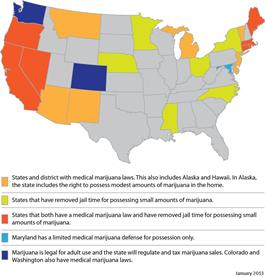How Do I Keep My Workplace Drug Free Now That Marijuana Laws Are Changing?
Since new state laws have been passed in Colorado and Washington state surrounding the issue of recreational use of marijuana, many employers are asking how to keep their workplaces drug free and whether they can still legally drug-test their employees. It isn't only employers in the aforementioned states who are asking these questions, but also those who work in one of the 18 states or in Washington, D.C., which have medical marijuana laws that allow individuals to use the drug legally for therapeutic purposes.
It is important that we look at the number of Americans who have been surveyed and have reported they were current users of marijuana to understand truly how involved individuals are with this substance. The statistics from a 2011 survey completed by the Substance Abuse and Mental Health Services Administration (SAMHSA) reported about 22.5 million Americans age 12 or older were current (used in the past 30 days) illicit drug users. Of these users, 18.1 million were current users of marijuana –- this is 8.7 percent of the U.S. population. The numbers are up from previous studies (17.4 million in 2010 and 14.5 million in 2007), but we also know that individuals surveyed may not have told the truth. Another study from a different source resulted in a higher number of users, and it was deemed respondents felt more confident revealing their usage to the other source rather than to a government organization.
The numbers are up from previous studies (17.4 million in 2010 and 14.5 million in 2007), but we also know that individuals surveyed may not have told the truth. Another study from a different source resulted in a higher number of users, and it was deemed respondents felt more confident revealing their usage to the other source rather than to a government organization.
So with the staggering result of how many individuals are marijuana users in the United States and with usage laws changing, how can employers keep a workplace drug free and provide a safe and productive environment for employees?
Drug test. It is still legal to conduct pre-employment drug testing, which includes testing for marijuana, in all states. However, it is important to check your state's laws because some states have specific mandatory drug testing laws and others have voluntary regulations.
A best practice is to be clear on your state's laws and have a precise, written workplace drug usage and testing policy that unmistakably states an employee cannot have, use, or be under the influence of marijuana in the workplace. Better yet, encompass other illegal and legal (alcohol usage policy, for example) substance policies into your handbook. Make sure you thoroughly cover all of your bases and are revising regulations as laws change.
You can state in your policy that detection of any amount of marijuana (or other illegal substance or alcohol) is a violation of company policy. Also include language on employee behavior while at work, regardless whether they have been drug-tested in the past and had a negative result. For example, just because an employee may be using marijuana for medicinal purposes does not mean he can be falling asleep at his desk. Poor performance, regardless of marijuana use or not, could prompt a drug test or consequences.
And finally, include language regarding what happens when you do receive a positive drug test result and the consequences for policy violations, regardless of the state's law.
The U.S. Department of Transportation (DOT) has issued a statement (http://www.dot.gov/sites/dot.dev/files/docs/odapc-notice-recreational-mj.pdf) making it clear that marijuana remains a Schedule 1 drug in the Controlled Substances Act and the use of marijuana use is not permitted under the DOT drug testing regulations. Many state laws reference and require following DOT procedures; you should also take into consideration workers' compensation and unemployment laws.
You have the right to maintain a drug-free workplace.
Melissa Sabus, C-SAPA, is Director, Drug & Occupational Health Screening for HR Plus, www.hrplus.com, an employment and background screening solutions company.
Posted by Melissa Sabus on Jan 30, 2013